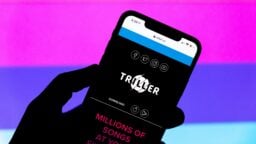A one-second-long producer tag is at the heart of a new copyright infringement lawsuit filed in US federal court.
Georgia-based musician and songwriter Jamal Britt is suing producer and songwriter Turbo the Great, along with Warner Chappell Music and numerous labels, over what he says is unauthorized use of the “run that back Turbo” audio clip that Turbo uses as his producer tag.
According to a complaint filed on January 9 in the US District Court for the Northern District of Georgia, Atlanta Division, the tag – which can be heard here – has appeared in more than 80 “popular songs.”
Those songs come from artists such as Lil Baby, Gunna, Nicki Minaj, Chris Brown, Moneybagg Yo and many others.
The labels and entertainment companies responsible for releasing the tracks that include the “run that back Turbo” tag are named as defendants in the suit, including Quality Control, Motown Records, Capitol Records, Young Stoner Life Records, 300 Entertainment, Universal Music Group, Chris Brown Entertainment, Young Money Records, Cash Money Records and Republic Records.
According to the complaint, which can be read in full here, in July 2017, Britt and Turbo (who is identified in the complaint as Chandler Durham) co-created a track called Afghanistan.
Britt alleges to have written the lyrics and “music elements” of the track, while Turbo “created the musical track and/or beat” for Afghanistan, and acted as engineer for the recording session. Britt claims that he vocalized and rapped the lyrics “run that back Turbo” as the introduction to the track, the complaint states.
Since then, “Turbo has unequivocally used an extrapolation of the original work and appropriated it as his own in nearly all of his productions,” the complaint alleges.
Britt “was never given notice that his voice was being used, never properly credited for his contributions to the songs in question and was never compensated from any of the royalty payments, profits, or other income garnered from the exploitation of his recorded voice,” the complaint asserts.
Among the tracks named in the lawsuit are Drip Too Hard, from rappers Lil Baby and Gunna, released in 2018. The track peaked at No. 4 on the Billboard Hot 100.
Also named are Never Recover by Lil Baby and Gunna with Drake, a double-Platinum track from 2018; Close Friends, a five-times Platinum track by Lil Baby from 2019; She Bumped Her Head, a 2020 track by Chris Brown; and Nicki Minaj’s 2019 Barbie Drip.
The songs amount to “an infringement of [Britt’s] copyright and right of publicity,” the complaint alleges.
It estimates that the songs featuring the “run that back Turbo” tag have generated “in excess of $10 million” in revenue.
“None of Turbo’s productions give credit to [Britt] and [Britt] has not received any compensation for his contribution to Turbo’s songs to-date.”
“Turbo failed to obtain [Jamal Britt’s] consent to exclusively transfer or otherwise license any copyright interests in the original work including plaintiff’s voice.”
Claim in Legal complaint filed in US federal court
On a number of occasions, Turbo “transferred, licensed and/or entered into exclusive producer agreements and songwriter/co-publishing agreements, and in doing so granted publishers, distributors, record labels, and other entities permission to use the original work,” the complaint continues.
“Turbo failed to obtain [Britt’s] consent to exclusively transfer or otherwise license any copyright interests in the original work including plaintiff’s voice.”
What’s more, because Turbo has trademarked the “run that back Turbo” tag, the lawsuit alleges violations of the Lanham Act, the US law regulating the use of trademarks.
“By attaching [Britt’s] recorded voice to the sound recordings listed herein, Defendant Durham has created a likelihood of confusion as to the origin of the sound recordings listed herein,” the complaint states.
The lawsuit also lays claim to income earned from touring and other appearances linked to the songs.
The “overwhelming success” of the tracks featuring the producer tag “has provided defendants substantial opportunities to tour and perform around the world,” the complaint claims.
“The revenue and profits derived from these performances and appearances, among all other revenue and profits, are directly attributable to the success of the infringing works… Thus, the touring and concert revenue generated by defendants is casually connected to” the allegedly infringed producer tag, the complaint argues.
“The touring revenue, concert revenue, licensing and synchronization revenues, and related public performance revenue should be disgorged to plaintiff.”
The lawsuit seeks a declaratory judgment that Britt is the “joint author” of the songs in question, and that he owns a share of these sound recordings.
It also seeks an accounting of all the income made from those tracks, to determine how much money he would be owed from the sale of the sound recordings, “and from any other use, distribution, or sale of the plaintiff’s songs.”
The lawsuit also seeks damages in an amount to be determined at trial, and reimbursement of court costs and legal fees.
Turbo signed a co-publishing deal with Warner Chappell Music in 2019.
The complaint is the latest in a series of court cases where a musician or producer’s relatively small and allegedly unrecognized contribution to a hit song has turned into a potentially large lawsuit.
One such lawsuit involves Dua Lipa’s megahit Levitating. In a complaint filed in August of last year, music producer Bosko Kante alleged that he didn’t give Levitating’s producers the right to use a talkbox vocal line that Kante created on remixes of the song.
Despite this, the vocal line appeared in remixes of the song, including the DaBaby version of the track that has become an international hit, the complaint alleged.
In another lawsuit, producer Terence Thomas, aka Master Tee, sued producer Tony D. Pizarro, label Interscope and its parent company Universal Music Group over what he says are unpaid publishing royalties for Tupac Shakur’s three-decade-old hit Dear Mama.
Also named as defendants are Allen Hughes, the director of the recent TV series Dear Mama, about Shakur’s relationship with his mother, and Joshua’s Dream Music, the publishing company for Tupac Shakur’s estate.Music Business Worldwide





